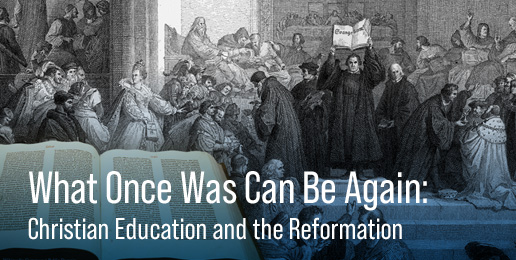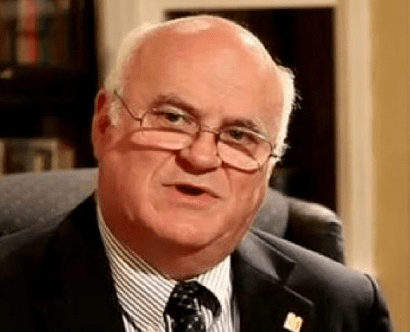
We are now in mid-2017, the 500th anniversary of the epochal and world-changing Reformation. By revisiting the teaching of that era, we can gain a renewed hope for the modern evangelical Church, the rightful heir to that rich theology and history.
In 1517, it was the Roman Catholic Church that needed a Reformation, but in 2017, it is the evangelical Church that needs a Reformation. We can and should study the 5 solas of the Reformation in our day and seek to renew these teachings in our evangelical churches. But I want to posit a forgotten ideal of that same time under the theme: What once was can be again: Christian education and the Reformation.
For over 20 years, I have been traveling across the country promoting the mission of the Exodus Mandate: encouraging and assisting Christian families and churches to leave the state-sponsored public school system for the promised land of K-12 Christian schools or home schooling.
It is our hope and prayer that a “fresh obedience” by churches and families in the education their children according to biblical commands will prove to be a key for the revival of our families, churches and culture.
Further, we believe that the state or government has no God-ordained role in the education and discipleship of children, but that belongs to the family and the Church. I am indebted to Dr. Paul Kienel’s A History of Christian School Education for much of my research in this address.
APOSTOLIC ERA TO MEDIEVAL PERIOD
From the apostolic era until the Medieval era, the Christian education of children was largely informal and in small home-based schools not unlike our home-school co-ops today. The early Church itself had no buildings for church assemblies or school until after 250 AD. Christians had small schools, and some of them met in the catacombs.
Kienel right concludes,
“Christian school education is the second oldest form of continuous education in the Western world, second only to Jewish schools” (Paul Kienel, I).
What we call K-12 Christian education was a universal practice and an integral part of the early church experience until the era of Constantine.
After Constantine and the Council of Nicea in 325 AD, the Roman Catholic Church began to assert itself over all the churches, but the Church continued the same model of Christian education of children and youth.
PRE-REFORMATION CHRISTIAN SCHOOLS
In the period 100 years before the Reformation, we see emerging Christian schools. One such example is the Brethren of the Common Life schools founded by Gerhard Groote, a wealthy and educated man from Holland. These schools stressed piety and Christian living, and unlike Catholic schools at that time, sought to educate the common people and children.
They used the Bible, taught the classics, Latin and Greek, and were concerned about the intellectual, as well as the social and physical lives of their students. These schools existed primarily in Holland and Germany.
They held, like Christian schools today, that “learning without piety was rather a curse than a blessing” (Kienel p. 189).
They taught the Scripture in the vernacular, thus living outside Catholic rules which did not permit the Scriptures to be in hands of the common man. These schools were foundational to the Reformation. Martin Luther, John Calvin, Ulrich Zwingli and other reformers were trained in Brethren of Common Life schools or ones inspired by them.
CHRISTIAN EDUCATION AND THE REFORMATION
Martin Luther sought to change elementary, secondary and higher education in Germany and largely succeeded. His sentiment is expressed as follows:
“For it is my serious opinion, prayer and desire that these hog-pens and Satan’s schools either be sunk into the abyss or changed into Christian schools” (Luther, “To Magistrates and Councilmen” p. 192 in Kienel, I).
He first reformed the faculty and curriculum at Wittenberg University and then began reforming elementary and secondary education.
He further stated,
“I am much afraid that schools will prove to be gates of hell, unless they diligently labor in explaining the Word of God, engraving them in the hearts of youth. I advise no one to place his child where the Scriptures do not reign paramount. Every institution in which men are not unceasingly occupied with the Word of God must become corrupt.”
John Calvin, another major Reformer, did significant work with Christian schools. Like Luther, he was an aggressive education reformer committed to Bible-based Christian schools. Calvin, as a Christian educator, was mentored by Johannes Sturm in Strasbourg, himself a graduate of a Brethren of Common Life School.
Calvin had been a teacher at Sturm’s Christian school, and he carried that model back to Geneva in 1541 and established the Geneva Academy in 1558-1559.
A principal reason for the durability of the Reformation was the thorough integration of Christian education into elementary, secondary and seminary schools and, thereby, into all aspects of Church and family life. A reformation of the Church without a corresponding reformation in Christian education would have been unthinkable to Calvin, Luther, Knox and the other Reformers, too (Kienel, I, p.222).
Paul Kienel said of the Reformation period,
“The great church reformers-Martin Luther, John Calvin, John Knox, Ulrich Zwingli, and others- gave as much energy to establishing Christian schools as they gave to reforming the church. To them Christian school education and church reform were inseparable allies. Neither, they believed, could succeed without the other” (I, p. xvii).
WHERE THEN ARE WE TODAY IN THE US?
The Barna Group did an analysis for ACSI on the issue entitled “Multiple Choice: How Parents Sort Education Options in a Changing Market.”
An ACSI official reported to me that in the last decade 1500 small ACSI schools have closed in the US. This is a 20% decline in student population from 5,000 member schools over a 10 year period. Yet in the same period, ACSI is growing rapidly in Africa, Asia, South America, and this is mostly in areas of great poverty.
The Barna study also revealed some shocking statistics: only 9% of conservative or evangelical pastors very strongly support K-12 Christian education, while 20% show moderate support, and 28% of conservative pastors are unlikely to recommend or support K-12 Christian education.
The ACSI official described this to me as actual “opposition to Christian education.”
WHAT IS TO BE DONE?
In November 1970, the worst single sports disaster occurred near Huntington, WV, when the charter plane carrying the Marshall University football team, coaches, parents and booster club members crashed on a mountain with a complete loss of life.
The tragedy and its aftermath are told in the classic movie, We Are Marshall.
Matthew McConaughey and Matthew Fox are the actors who portray the 2 coaches who picked up the pieces and rebuilt the fortunes of the Marshall football program. Marshall got a special dispensation from the NCAA allowing them to play only freshmen during this rebuilding program. For years they lost almost every game and most by lopsided scores.
In the pivotal scene in the movie, worth the price of the movie itself, Coach Dawson complained bitterly that he could not continue while the Marshall football program defied the main rule of sports: “winning is everything and nothing else matters.”
The Head Coach said he agreed with that axiom, but he added,
“It doesn’t matter if we win or lose. But what matters is that we simply take the field, that we suit up and keep this program alive, that we play the game. One day, not today, not this season, not next season, we will be like every other team….and when that day comes is when we will honor them [the teammates who perished].”
In the church today, it’s as if the evangelical leadership plane with most of the pastors has crashed, and we are now left to rebuild the commitment to K-12 Christian education in all the churches. We in the American Church are not like our forefathers in the apostolic age, nor the Reformers, and not even like our poor brethren in South America, Africa, Asia and even Communist China where Christian education is growing.
For them K-12 Christian education is part of the normal Christian life.
Like the Marshall University football team, we must simply take the field and keep this program alive. In the 1970’s, Marshall had the worst record of any major college football program in the U.S. In 1984, they had their first winning season in 20 years.
This was followed by 8 conference titles, 5 Bowl games and 2 national championships. From the ashes they rose and continued.
Jesus said,
“My Father has been working until now. And I am working.”
The Lord is working for us. We have His sure promise.
For us, if we believe in the clear commands of Scripture concerning the education of children and if we remain faithful and do the hard work, then what once was can be again.
























